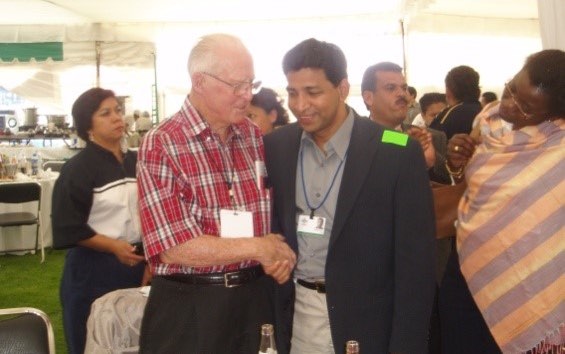It was a decade after the Green Revolution took strong roots in India, in the late 1970s, my first year in college, and I was not sure if agriculture was the right major for me. A magazine article with a cover photo of Dr. Norman Borlaug resolved my confusion. The article was about how an American plant breeder brought about the Green Revolution in India, saved millions from starving and won a Nobel Prize. Dr. Borlaug became my personal hero and plant breeding became my favorite subject for the next four years. In 1986, I met my hero while I was doing my PhD at Iowa State University. Dr. Borlaug had come to the university to give a lecture on the Asian Green Revolution and to dedicate all his lifetime correspondences to the archives of the Parks Library on campus.
At the end of his lecture I went up to him and introduced myself. I took the opportunity and asked him what advice he would have for me as I was finishing my PhD in agricultural economics and planning to return to India to work for the government as a policy economist. He said three things: 1. “Go to Africa, where food production is still a problem; India has enough scientists to take care of its agriculture.” 2. “When you go there, don’t sit in the AC room and write policies; work with farmers and get your hands dirty.” 3. “Focus on building capacity of national agricultural systems to address food insecurity.” The Green Revolution in Asia was indeed a Capacity Revolution. He also said the capacity he built among an army of breeders was responsible for the Asian Green Revolution. (See my interview with him.)
Taking Dr. Borlaug’s first dictum literally, I began to look for an opportunity to work in Africa. Prof. Per Pinstrup-Andersen, my professional mentor, gave me that opportunity at Cornell University and sent me to Malawi as a Food Security Advisor to its government. Once I landed in Malawi and started working in the Ministry of Agriculture, the other two dictums fell into place. Famine hit Malawi in the early 1990s due to frequent drought, resulting in a 60 percent reduction in food production in 1992.
We built the capacity in the national agricultural and university system that for collecting food and nutrition data, which was used for developing decentralized intervention programs. This approach became handy to prevent famine and to put the food system back on the normal track. We not only built the human capacity but also the institutional capacity to face future famines. We also strengthened the policy process to bring the researchers and policy makers together to set priorities for agricultural research and development strategies. After five years of famine-fighting in Malawi, I moved back to IFPRI in Washington, D.C. Here, a number of World Food Prize Laureates influenced me: Dr. Howarth Bouis would become my role model, Nutrition Economics researcher Dr. Lawrence Haddad would become my cheerleader (by encouraging me to do more of what we did in Malawi in Bangladesh, Mozambique, and Ghana), and Dr. Jan Low would become my collaborator in building Mozambican national capacity.
Beginning with Dr. Borlaug’s inspiration to go to Africa and work in Malawi 30 years ago, I was able to train a large number of policy analysts, researchers and advisors in more than 50 developing countries and build organizational and policy system capacities in several of them. Prof. M.S. Swaminathan, Dr. Borlaug’s close collaborator and the first World Food Prize Laureate, also encouraged my work in South Asia. Capacity development is an arduous and long-term task, but unfortunately most development partners are only interested in short-term projects and quick wins. Implementing individual, institutional, and system capacities collectively can result in transformation. Brazil, China, Nigeria, and India—where I have trained food policy researchers—are good examples. My recent engagements in strengthening Nigerian agricultural research systems as part of the Agricultural Transformation Agenda initiated by Dr. Akinwumi Adesina and contributing to Dr. Gebisa Ejeta’s efforts in Purdue’s Borlaug Summer Institute were most gratifying and in line Dr. Borlaug’s dictums.
I continued to meet and interact with Dr. Borlaug and update him on my work until his death in 2009. When I met him last, I lamented that capacity building is a tiresome job that largely goes unrecognized. In response, he said, “Keep fighting and working for your cause; results will show one day. Without adequate national capacity there cannot be sustained agricultural transformation.” I did not expect anything less from him. Because of him and his three dictums, capacity revolution remains my career passion and a tool for solving word food problems.
Suresh Babu is a Senior Research Fellow and Head of Capacity Strengthening at IFPRI. This post first appeared on the World Food Prize Borlaug Blog.







